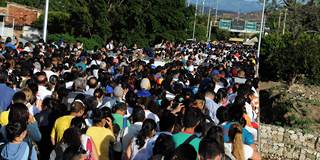The chaos into which Venezuela has fallen may seem to be beyond belief, given that the country sits on the world's largest oil reserves. In fact, Venezuela's meltdown is a product of belief – and it is not alone in adopting a dysfunctional paradigm for interpreting the world.
CAMBRIDGE – When we hear of a catastrophe that has befallen a friend, we feel both empathy and a sense of vertigo. We wonder whether it could happen to us: Is this catastrophe the result of some peculiar characteristic that we fortunately do not share? Or are we also vulnerable? If so, can we avoid a similar fate?
The same logic applies to countries. On the weekend of July 16-17, Venezuelans were given the opportunity to cross the border into Colombia for up to 12 hours. It was an event reminiscent of the fall of the Berlin Wall. More than 135,000 people used this respite to go to Colombia to buy basic necessities. They traveled hundreds of miles and converted their cash for just 1% of the foreign exchange they would have received had they been allowed to exchange it at the official rate applicable for food and medicines. And yet they found it worthwhile, given the hunger, shortages, and desperation at home.
The international press has reported the collapse of Venezuela’s economy, of its health system, of personal security, and of constitutional rule and human rights. All of this is happening in the country with the world’s largest oil reserves, just two years after the end of the longest oil-price boom in history. Why? Could it happen elsewhere?

CAMBRIDGE – When we hear of a catastrophe that has befallen a friend, we feel both empathy and a sense of vertigo. We wonder whether it could happen to us: Is this catastrophe the result of some peculiar characteristic that we fortunately do not share? Or are we also vulnerable? If so, can we avoid a similar fate?
The same logic applies to countries. On the weekend of July 16-17, Venezuelans were given the opportunity to cross the border into Colombia for up to 12 hours. It was an event reminiscent of the fall of the Berlin Wall. More than 135,000 people used this respite to go to Colombia to buy basic necessities. They traveled hundreds of miles and converted their cash for just 1% of the foreign exchange they would have received had they been allowed to exchange it at the official rate applicable for food and medicines. And yet they found it worthwhile, given the hunger, shortages, and desperation at home.
The international press has reported the collapse of Venezuela’s economy, of its health system, of personal security, and of constitutional rule and human rights. All of this is happening in the country with the world’s largest oil reserves, just two years after the end of the longest oil-price boom in history. Why? Could it happen elsewhere?